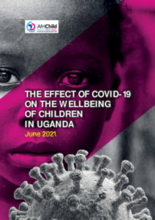The assessment of COVID-19 effect on the Wellbeing of Children in Uganda was conducted between June and August, 2020 by AfriChild Centre, Makerere University. The study took a retrospective approach with a focus on the three months of the COVID-19 lock down (AprilJune 2020) to counter contradictions that could arise from a longer study period in the face of changing dynamics of COVID-19.
To generate evidence, a cross-sectional survey design utilizing quantitative and qualitative approaches of data collection was used. A total of 644 children aged 10-17 distributed across four districts of Lyantonde, Kampala, Gulu and Luuka were interviewed using a structured questionnaire. Data from the structured questionnaire was supplemented with qualitative techniques of data collection, i.e., Focus Group Discussions (FGD) that targeted parents/adult caregivers, In-depth Interviews (IDIs) with children and Key Informant Interviews (KIIs) with duty bearers at various levels. In addition, secondary analyses were conducted for the Uganda Child Help Line (UCHL) data base and the Uganda Police Force Child and Family Protection Department (CFPD) and triangulated with study findings.
While the study aimed at establishing the wellbeing of children in general during COVID-19 lockdown, the evidence collected and presented in this report spans different strands notably the nature of violence against children (VAC); perpetrators of VAC; reporting VAC; and Children’s access to both preventive and response services. Based on the findings, the study identified critical issues emerging and draws policy and program implications for child wellbeing during similar crises in future.

